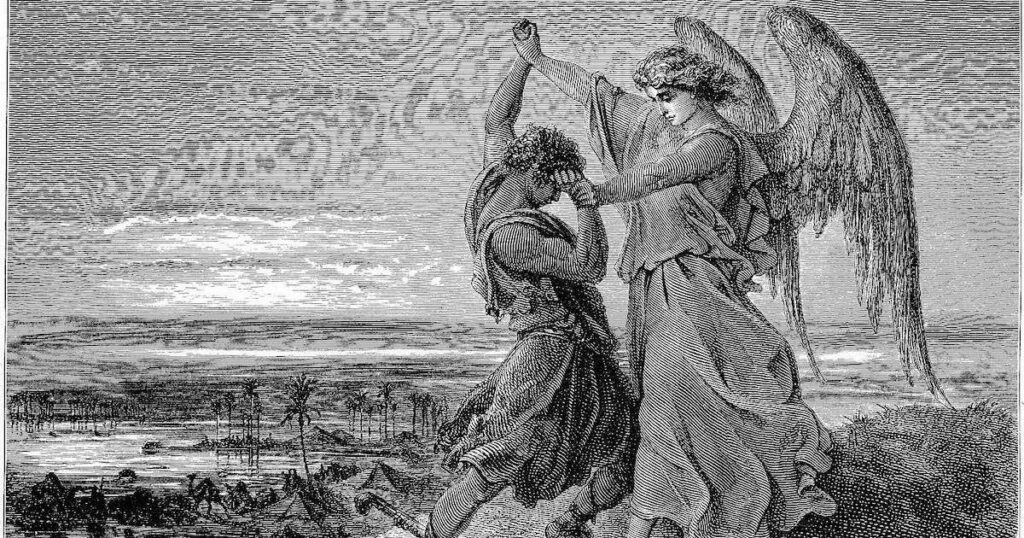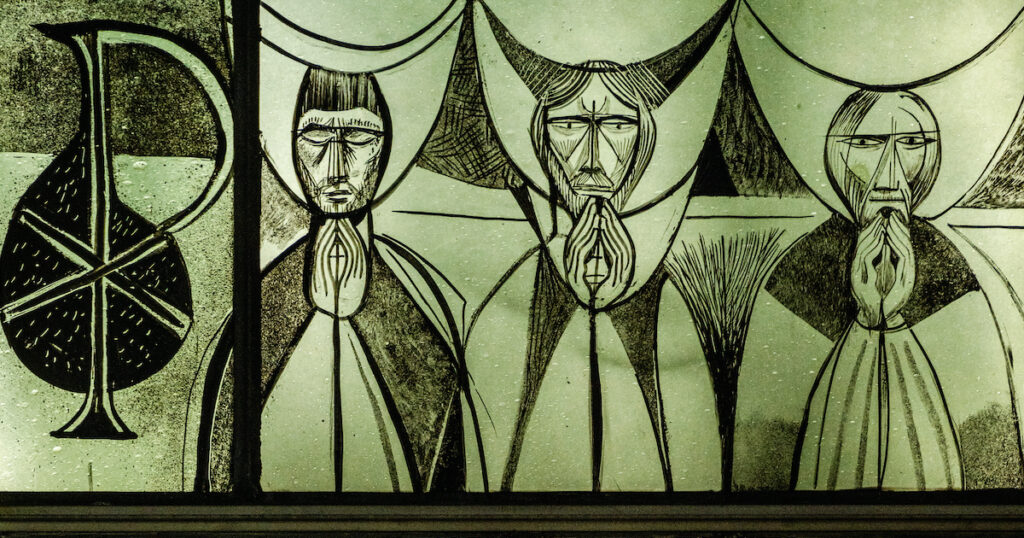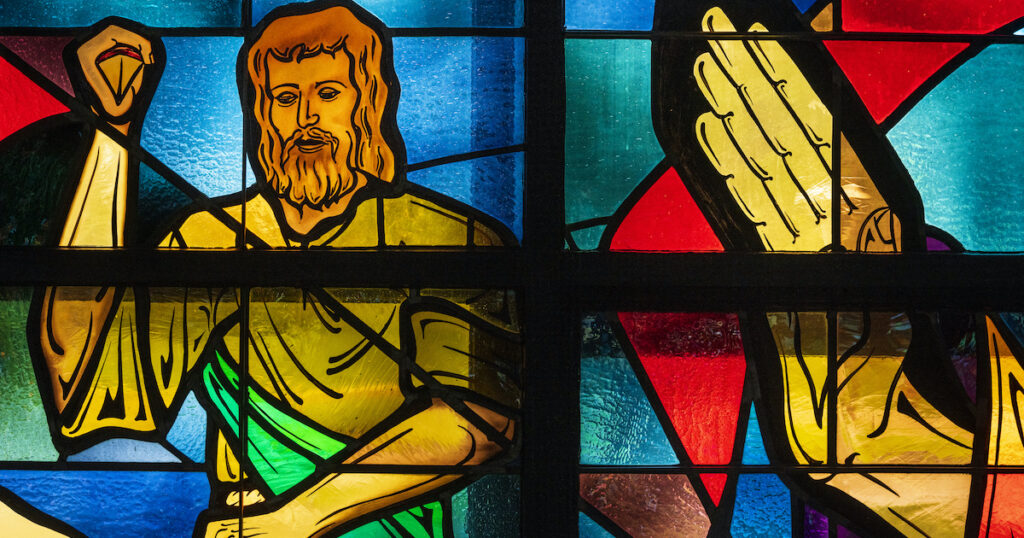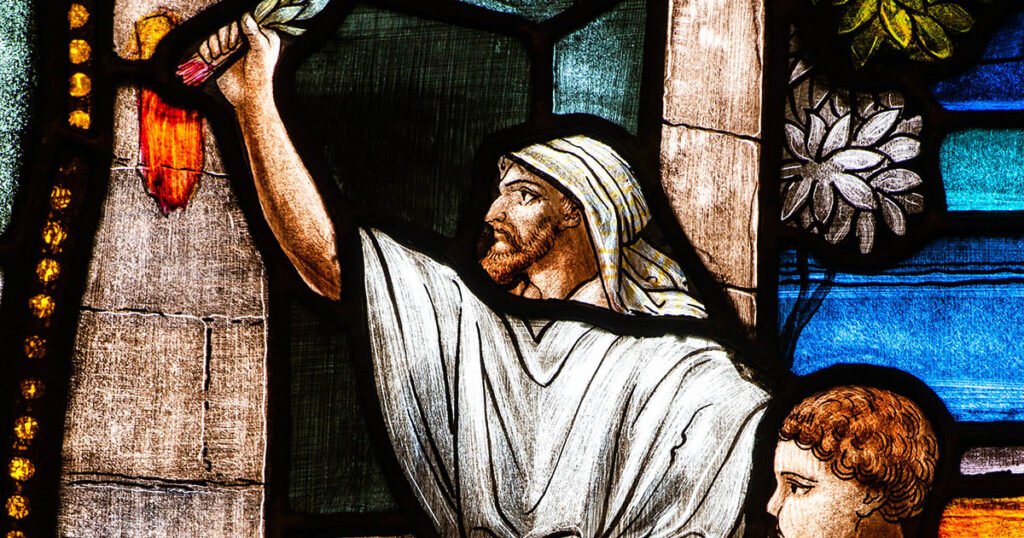In the year that King Uzziah died I saw the Lord sitting upon a throne, high and lifted up;
(Isaiah 6:1)
and the train of his robe filled the temple.
The goal of the Christian life is to see God. We see Him now veiled beneath bread and wine, in the waters of Holy Baptism, in the preaching of the Holy Gospel, and even hidden behind our neighbor — “Truly, I say to you, as you did it to one of the least of these my brothers, you did it to me” (Matt. 25:40). St. Paul says, “For now we see in a mirror dimly, but then face to face. Now I know in part; then I shall know fully, even as I have been fully known” (1 Cor. 13:12). A day is coming when we will no longer see dimly. We shall see Him as He is: “Beloved, we are God’s children now, and what we will be has not yet appeared; but we know that when he appears we shall be like him, because we shall see him as he is” (1 John 3:2).
In the Old Testament, the saints of old were also given to see the Lord. “Long ago, at many times and in many ways,” the letter to the Hebrews says, “God spoke to our fathers by the prophets” (Heb. 1:1). The prophets were first called “seers” (1 Sam. 9:9). This wasn’t merely a mentalseeing or something of the imagination. It was actually seeing with their eyes. These visionsof the prophets were their access into the heavenly throne room, the council of the Lord, where the heavenly conversation is found (Psalm 82:1; 89:7). A scene from 1 Kings illustrates the contours of this council well. Jehoshaphat asks to “Inquire first for the word of the Lord” (1 Kings 22:5). Then Micaiah gives us to peer into the assembly of the heavenly council:
I saw the Lord sitting on his throne, and all the host of heaven standing beside him on his right hand and on his left; and the Lord said, “Who will entice Ahab, that he may go up and fall at Ramoth-gilead?” And one said one thing, and another said another. Then a spirit came forward and stood before the Lord, saying, “I will entice him.” And the Lord said to him, “By what means?” And he said, “I will go out, and will be a lying spirit in the mouth of all his prophets.” And he said, “You are to entice him, and you shall succeed; go out and do so.” Now therefore behold, the Lord has put a lying spirit in the mouth of all these your prophets; the Lord has declared disaster for you.
(1 Kings 22:19–23)
We enter somewhere in the middle, in an ongoing conversation. Micaiah the prophet witnesses the Lord’s dialogue with all the hosts of heaven.
Job 1–2 gives us a similar description. Again, we jump in mid-conversation:
Now there was a day when the sons of God came to present themselves before the Lord, and Satan also came among them. The Lord said to Satan, “From where have you come?” Satan answered the Lord and said, “From going to and fro on the earth, and from walking up and down on it.” And the Lord said to Satan, “Have you considered my servant Job…” So Satan went out from the presence of the Lord.
(Job 1:6–12)
To add yet more vibrancy to our picture, let’s turn briefly to Zechariah 3, with the ordination of Joshua the high priest and the rebuke of Satan.
Then he showed me Joshua the high priest standing before the angel of the Lord, and Satan standing at his right hand to accuse him. And the Lord said to Satan, “The Lord rebuke you, O Satan! The Lord who has chosen Jerusalem rebuke you! Is not this a brand plucked from the fire?” Now Joshua was standing before the angel, clothed with filthy garments. And the angel said to those who were standing before him, “Remove the filthy garments from him.” And to him he said, “Behold, I have taken your iniquity away from you, and I will clothe you with pure vestments.” And I said, “Let them put a clean turban on his head.” So they put a clean turban on his head and clothed him with garments. And the angel of the Lord was standing by.
(Zech. 3:1–5)
This council scene assumes a legal tone, justice is spoken and the judgment rendered: Satan is cast out of the council. Consider the Christological implications here of Jesus’ statement in Luke’s Gospel: “I saw Satan fall like lightning from heaven” (Luke 10:18).
All of this brings us to Isaiah, who saw the Lord. And not just seeing, but hearing the call, “Who will go for us?”, Isaiah offers to go: “Here am I! Send me” (Isaiah 6:8). In the council, the Lord gives Himself to be seen along with His Word. By inviting His prophets to see and hear the vision of His will, He intends for them to go and proclaim this Word. In our passage below, St. Jerome wrestles with this notion of seeing God especially in light of the numerous passages that speak of not seeing God and living.
St. Jerome (ca. a.d. 345–420) was educated in Rome, but then devoted himself to the ascetic life, eventually living in a monastery in Bethlehem. He’s famous for his translation of the Scriptures from Hebrew and Greek into Latin (the Vulgate), as well as for his numerous biblical commentaries. Here is Jerome on Isaiah 6:1:
The Hebrew states quite beautifully that it is not the Lord himself who fills the temple (6:1). His throne is in heaven, and the earth is his footstool. As we read in the Psalms, The Lord is in his holy temple, the Lord’s throne is in heaven (Ps 11:4). It was his train that filled the temple (6:1). From the Gospel of John and the book of Acts we learn that it was the Lord who was seen in this vision. About these things John said: Isaiah said this because he saw his glory and spoke of him (John 12:41). There can be no doubt that he is referring to Christ. Moreover, in the Acts of the Apostles, when speaking to the Jews in Rome, Paul says: The Holy Spirit was right in saying to your fathers through Isaiah the prophet: “Go to this people and say, ‘You shall indeed hear but never understand, and you shall indeed see but never perceive.’ For this people’s heart has grown dull, and their ears are heavy of hearing, and their eyes they have closed; lest they should perceive with their eyes, and hear with their ears, and understand with their heart, and turn for me to heal them” (Acts 28:24–27; 6:9–10). Here the Son is seen as reigning, but the Holy Spirit also speaks because the Spirit shares in the divine majesty and the unity of the Holy Trinity.
Someone might also ask how the prophet can say he saw the Lord, and not simply the Lord, but the Lord of hosts, when Christ himself later testifies according to the Evangelist John: No one has ever seen God (John 1:18). God also told Moses, You cannot see my face; for man shall not see me and live (Exod 33:20). To which we reply that the eyes of the flesh are unable to see the divinity of the Father, nor that of the Son, nor of the Holy Spirit, because in the Trinity there is one nature. The Trinity can be seen only with the eyes of the mind. It was to this that the Savior was referring when he said, Blessed are the pure in heart, for they shall see God (Matt 5:8). We read that Abraham saw God in a human form (cf. Gen 17:1; 18:1) and that Jacob wrestled with someone who seemed to be a man but was, in fact, God (Gen 32:24–30). Jacob named the place where he had wrestled with God Peniel, which means the face of God, for he declares, I have seen God face to face, and yet my life has been preserved (Gen 32:30). Ezekiel also saw God in the form that had the appearance of a man sitting above the cherubim and below what appeared to be his loins it was fire, and above his loins it was like the appearance of brightness, like gleaming bronze (Ezek 8:2). The nature of God cannot be perceived, but God reveals himself to human beings insofar as he wishes to be seen.[1]
Notice how quickly Jerome identifies the seen Lord seen as Christ. This is because the divine nature as such cannot be seen, but in the person of Christ He gives Himself to be seen “insofar as he wishes to be seen.” The Christology at play here recognizes the presence of the pre-incarnate Christ. This second person of the Trinity wrestles with Jacob, appears to Abraham, sits on the cherubim in Ezekiel’s vision, and meets with Moses “face to face” (Ex. 33:11).
Jerome also wonderfully draws together numerous passages of both Old and New Testaments to help us see the full perspective of how God can both be seen and unseen. He wades through what seems contradictory and resolves them in a manner that helps us hear the texts properly.
Now, when you find the Lord appearingto a prophet in the Old Testament, you do not need to resort to a conception of psychological intuition or imagination, but you can rejoice in our Lord’s self-giving so His people might hear and access the heavenly conversation. That’s what is now given to us through the apostolic preaching and the sacramental gathering of His people “with angels and archangels and all the company of heaven.” Welcome to the heavenly council.
[1] Jerome, Commentary on Isaiah 6:1-3, CCSL 73:84-87; cited in Robert Louis Wilken, The Church’s Bible: Isaiah (Grand Rapids: Eerdmans, 2007), 69-70.






I’m going to be reading this over and over. It’s a lot for me to process!
Great! Glad to hear you’ll be coming back. Don’t hesitate to comment with questions.
RSA